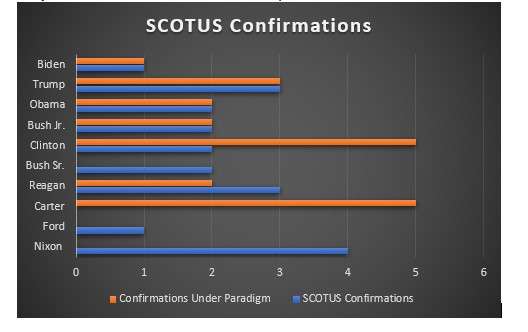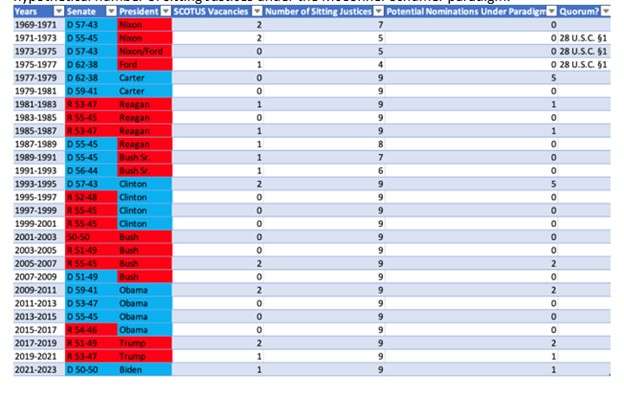The Volokh Conspiracy
Mostly law professors | Sometimes contrarian | Often libertarian | Always independent
Prof. Eric M. Freedman on the S. Ct. Under a Block-the-Justices-If-You-Can Rule
An interesting observation from Prof. Freedman (Hofstra); I think that, if such a rule were adopted (and I don't advocate it), the result would often likely be Presidents and the Senate reaching a compromise on a truly centrist Justice—but I might be mistaken, and in any even the thought experiment is worth considering:
It doesn't take a lot of imagination to foresee a period in the near future in which Presidents only get to fill SCOTUS seats when their party controls the Senate. Both Senator McConnell and Senator Schumer have hinted at this possibility.
How would that play out? At minimum, this hardball paradigm would create a lot of lumpiness in the filling of seats. The number of sitting Justices would gradually dwindle during periods of divided control and then a President would get to fill a burst of them.
More troubling is the possibility that the number of Justices might dwindle to five. Then—because by law a quorum of the Court is six, 28 U.S.C. Sec. 1, S.Ct.R. 4—SCOTUS could not act at all. Essentially, the last word would be in the lower courts. See, e.g., Arunga v. Obama, 137 S.Ct. 2194 (2017); Jaffe v. Roberts, 137 S.Ct. 2192 (2017); 28 U.S.C Sec. 2109, and the discussion here.
For example, if the Senate had implemented the hardball paradigm since 1969:
As shown below, Presidents Nixon (who filled four vacancies), Ford (who filled one), and Bush Sr. (who filled two) would have filled no Supreme Court vacancies. President Reagan would have filled only two seats as opposed to three. On the other extreme, President Carter would have named five Justices as opposed to zero, and President Clinton would have filled five seats as opposed to two.
Moreover, as shown in the following table, from 1971-1977, the Supreme Court would not have had a quorum.
That period included the Pentagon Papers case (New York Times v. U.S., 403 U.S. 713 (1971)) in which the Second Circuit and the D.C. Circuit reached opposite results, and U.S. v. Nixon, 418 U.S. 683 (1974), which arrived at SCOTUS by way of a petition for certiorari before judgment filed by the government to insure a prompt and definitive resolution of the controversy.
Perhaps, as Eugene suggested on reading an earlier draft of this post, the hardball scenario is far-fetched: at the end of the day, what I described as political sanity will prevail and the branches will continue to reach compromises on nominees in order to prevent SCOTUS from becoming dysfunctional.
Actually, as Eugene also suggested, perhaps it is wrong to be considering the hardball scenario as an instance of political insanity. Both sides may rationally find it in their interests to resist compromise. If the President is content with the decisions of the lower courts, that is an incentive to nominate someone unconfirmable and get the benefits of tossing red meat to the base. If the Senators in the majority are content with the decisions of the lower courts, that is an incentive to block any nominee at all and face down whatever attacks might be made on them as obstructionist.
But what may be in the political self-interest of the actors may be far from being in the national interest. Under the hardball paradigm, officeholders looking after their own short-term political interests deprive the polity of the Constitutional safeguard of an independent Court with the power to check them.
Or perhaps, to mix sports metaphors a bit, Presidents might decide to respond to hardballs with Hail Mary's—to respond to an obstructionist Senate with recess appointments to the Court. That, too, would be sub-optimal. Not only are such maneuvers gambles on outcomes that may not happen, but they put the Justices under a variety of undesirable pressures to rule in such a way as to retain the seat.
In short, there are many plausible scenarios under which tactics that may be in the political self-interest of elected officeholders disserve the national interest. The polity needs the Constitutional safeguard of an independent Court with the power to check those officeholders. To wound the Court is to make all of us less safe against the dangers of faction.
I certainly hope that in fact the branches will continue to exercise their respective political powers responsibly so as to fill any empty seat with a nominee reasonably acceptable to all concerned. But at a time when many heretofore unthinkable political scenarios have already come to pass, the hardball paradigm has regrettably become thinkable. That suggests that We the People should be thinking in advance about how to make sure that our ostensible agents act in our true interests.
This moment of apparent stability in the membership of the Court might be a good one to seek bipartisan agreement on a statutory safeguard against the hardball paradigm. Perhaps such a statute could provide that with respect to any SCOTUS nomination that is submitted more than six months prior to the end of a Presidential term, the Senate must act within 120 days (which should be long enough). If it fails to do so, the Senators' pay and (more critically) office expenses, including staff salaries, will be withheld until they do.
I'd love to hear what readers think.




Show Comments (15)